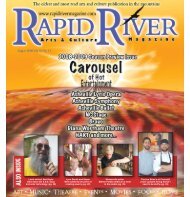Get Tickets Now to the Season's Best Performances - Rapid River ...
Get Tickets Now to the Season's Best Performances - Rapid River ...
Get Tickets Now to the Season's Best Performances - Rapid River ...
You also want an ePaper? Increase the reach of your titles
YUMPU automatically turns print PDFs into web optimized ePapers that Google loves.
R A P I D R I V E R A R T S & C U L T U R E M A G A Z I N E<br />
artful living<br />
Needing<br />
“We need one more thing <strong>to</strong> make us happy. One thing<br />
leads <strong>to</strong> <strong>the</strong> next, perpetuated by our desire <strong>to</strong> have<br />
final satisfaction. But <strong>the</strong> next experience feels uneasy,<br />
and we still need one more thing… The desire <strong>to</strong> feel<br />
satisfied is a continual process that drives our lives,<br />
and <strong>the</strong> end result is suffering… it’s just what ends up<br />
happening when we are driven by negative emotions.<br />
~ Sakyong Mipham (Turning <strong>the</strong> Mind in<strong>to</strong> an Ally)<br />
What do we really need? That<br />
simple question could well be<br />
an important key <strong>to</strong> happiness<br />
and wisdom. And beyond <strong>the</strong><br />
question of what do we really<br />
need is <strong>the</strong> more germane question: Why<br />
are our needs so endless? What are all <strong>the</strong>se<br />
wants that, at a deep psychological level, become<br />
needs? Sakyong Mipham, <strong>the</strong> Tibetan/<br />
American meditation teacher gives a very<br />
good answer when he says, “it’s just what<br />
happens when we are driven by negative<br />
emotion.”<br />
– as we certainly are, ei<strong>the</strong>r very<br />
blatantly or subtly, much of our waking lives.<br />
We want things <strong>to</strong> be better; we want<br />
more for ourselves than life is giving. We<br />
have an emotional uneasiness as <strong>to</strong> whe<strong>the</strong>r<br />
we are enough, and so have a ra<strong>the</strong>r unlimited<br />
sense of needing more, and for our<br />
situation <strong>to</strong> be better. And when things are<br />
<strong>the</strong> way we want <strong>the</strong>m <strong>to</strong> be, we want <strong>the</strong>m<br />
<strong>to</strong> stay that way – but <strong>the</strong>y don’t, <strong>the</strong>y can’t.<br />
Everything changes, but what we want is unchanging<br />
happiness - without even knowing<br />
what that means. So, we experience anxiety,<br />
anger, jealousy, worry, sadness, despair<br />
– negative emotions that drive us.<br />
There are many extrapolations of Buddhism’s<br />
Four Noble Truths on <strong>the</strong> nature<br />
of suffering, but a very useful variation is<br />
that we suffer because, whe<strong>the</strong>r we express<br />
it as a need or a want, we often experience<br />
that we need things <strong>to</strong> be different from <strong>the</strong><br />
way <strong>the</strong>y are in order <strong>to</strong> control our negative<br />
emotions. Again, this can be on very blatant<br />
or subtle levels, and taking that extrapolation<br />
<strong>to</strong> <strong>the</strong> teaching’s resolution, <strong>the</strong> fourth<br />
of <strong>the</strong> Truths, we could say that <strong>the</strong> way<br />
out of negative emotional suffering is <strong>to</strong> not<br />
need for things <strong>to</strong> be different from <strong>the</strong> way<br />
<strong>the</strong>y are in order for us <strong>to</strong> be OK.<br />
“Well, of course,” you say. When this<br />
moment is <strong>the</strong> way I want it <strong>to</strong> be, I am fine,<br />
I am happy, and when it is not <strong>the</strong> way I<br />
want it <strong>to</strong> be, I am not fine and happy. Isn’t<br />
that <strong>the</strong> natural way of things? But herein<br />
lies our problem. Our well-being is <strong>the</strong>n<br />
dependent on <strong>the</strong> circumstances of our lives<br />
as we interpret <strong>the</strong>m in our minds. This<br />
is nei<strong>the</strong>r natural – meaning <strong>the</strong> way of<br />
BY BILL WALZ<br />
Nature, nor is it an<br />
enlightened relationship<br />
<strong>to</strong> our unique human<br />
capacity <strong>to</strong> relate <strong>to</strong> life with abstracting<br />
intelligence.<br />
Happiness is a mental state. It occurs<br />
in <strong>the</strong> mind. Nothing outside of ourselves<br />
is <strong>the</strong> source of our happiness, ra<strong>the</strong>r our<br />
mind deciding it is happy with what is happening<br />
is <strong>the</strong> source of our happiness. What<br />
is unfortunate is that we don’t realize that<br />
we have <strong>the</strong> capacity <strong>to</strong> cultivate <strong>the</strong> mental<br />
state of happiness (more accurately, well-being)<br />
as our natural state in a manner that can<br />
be largely independent of <strong>the</strong> circumstances<br />
of our lives. Ultimate happiness (non-suffering)<br />
is <strong>the</strong> result of our embrace of every<br />
moment just <strong>the</strong> way it is.<br />
This moment,<br />
what is lacking?<br />
One of <strong>the</strong> great Zen lessons – a Koan<br />
from <strong>the</strong> 9th Century Chinese Zen master<br />
Rinzai – asks us, “This moment, what is<br />
lacking?”<br />
And when we are unhappy, we<br />
believe <strong>the</strong> answer <strong>to</strong> be that what is lacking<br />
is what we think<br />
we need <strong>to</strong> make <strong>the</strong><br />
moment more fulfilling, satisfying, safe, or<br />
whatever qualifier we have in our mind.<br />
The truth is that when we are fully<br />
present in any moment in our natural mind,<br />
it is as contemporary Zen master Thich<br />
Nhat Hanh tells us, “This moment is a perfect<br />
moment, this moment is my refuge.”<br />
Refuge from what? From <strong>the</strong> suffering, <strong>the</strong><br />
unsatisfac<strong>to</strong>riness of having <strong>the</strong> moment<br />
being different than what in our minds we<br />
think we need it <strong>to</strong> be.<br />
We live in <strong>the</strong> subtle and not-so-subtle<br />
experience of believing our fulfillment is<br />
not in this moment just as it is, but in some<br />
next moment that will be exactly <strong>the</strong> way we<br />
need for it <strong>to</strong> be <strong>to</strong> experience perfect happiness.<br />
Buddhism teaches of <strong>the</strong> thickness and<br />
multidimensionality of existence. Mostly,<br />
we live in <strong>the</strong> mind our society conditions<br />
in<strong>to</strong> us, our egoic (what Buddhists<br />
call “little”) mind, trapped in<br />
needing for its fulfillment some fantasy<br />
idea of a perfect self - finding fantasy<br />
perfection in a fantasy world.<br />
This mind is extremely limited<br />
in its perceptive abilities, and<br />
tends <strong>to</strong> focus on what is lacking,<br />
ra<strong>the</strong>r than <strong>the</strong> <strong>to</strong>tality and<br />
potentiality of what is present.<br />
This is <strong>the</strong> world of samsara,<br />
suffering.<br />
However, Buddhism<br />
teaches that<br />
<strong>the</strong>re is also <strong>the</strong> macroworld<br />
of <strong>the</strong> Big Mind,<br />
of our Being-self, in<br />
harmony with <strong>the</strong><br />
Universe realizing<br />
that <strong>the</strong>re is no<br />
separate self.<br />
There is always<br />
and only <strong>the</strong> Universe pressing itself in its fullness through this<br />
exform<br />
we experience as our self-in-<strong>the</strong>-given-moment,<br />
all interconnected and perfect<br />
just as it is. Nothing is needed because <strong>to</strong><br />
need is <strong>to</strong> be separate from <strong>the</strong> whole of<br />
what is, and <strong>the</strong>re is no separation. This is<br />
<strong>the</strong> mind of enlightenment, and this is <strong>the</strong><br />
mind in<strong>to</strong> which Buddhist teaching and<br />
meditation can open us.<br />
Imagine <strong>the</strong> <strong>to</strong>tal freedom, <strong>the</strong> <strong>to</strong>tal liberation<br />
when we realize that at an ultimate<br />
dimension always available <strong>to</strong> us, nothing<br />
more is needed, that this moment, exactly as<br />
it is, is perfect, exactly as it is. This is what in<br />
<strong>the</strong> Shambala tradition of Sakyong Mipham<br />
is called Shamatha – peaceful abiding.<br />
Within us all is <strong>the</strong> ability <strong>to</strong> abide peacefully<br />
in <strong>the</strong> present moment exactly as it is,<br />
not needing anything <strong>to</strong> be different <strong>to</strong> quell<br />
our negative emotions, not needing <strong>to</strong> get <strong>to</strong><br />
<strong>the</strong> next moment <strong>to</strong> quiet <strong>the</strong> restless little<br />
mind of ego questing for fulfillment of its<br />
fantasy identity in a fantasy world. Right here.<br />
This moment, nothing lacking. This is enlightenment.<br />
This is <strong>the</strong> heart of Buddhism.<br />
Does this mean <strong>to</strong> live passively? No<br />
– it means <strong>to</strong> do what needs <strong>to</strong> be done <strong>to</strong><br />
support and protect our lives and all life. It<br />
also means <strong>to</strong> bring forth our efforts in <strong>the</strong><br />
service of evolving an ever more conscious,<br />
compassionate and loving human society,<br />
but none of it from negative emotion.<br />
As Asian philosophy expert Alan Watts<br />
wrote: “Everything is as it can be.” And<br />
this moment is exactly as it can be as <strong>the</strong><br />
platform for <strong>the</strong> next moment in <strong>the</strong> very<br />
big picture. When we embrace what is, we<br />
can become courageous co-authors with <strong>the</strong><br />
Universe of what will be.<br />
Nothing is fixed and permanent. Everything<br />
is both being and becoming. What<br />
is, is. And what will pass, will pass. And<br />
what will be, will be. And our fantasies do<br />
not have <strong>to</strong> be <strong>the</strong> impotent protests or <strong>the</strong><br />
narcissistic desires of an individual driven by<br />
negative emotions from one perceived need<br />
<strong>to</strong> <strong>the</strong> next, but ra<strong>the</strong>r visions of what can be<br />
in an enlightened human society.<br />
“The purpose of Buddhism<br />
is <strong>to</strong> study ourselves and<br />
<strong>to</strong> forget ourselves. When<br />
we forget ourselves, we<br />
actually are <strong>the</strong> true<br />
activity of <strong>the</strong> big existence,<br />
or reality itself. When we<br />
realize this fact, <strong>the</strong>re is no<br />
problem whatsoever in this<br />
world, and we can enjoy<br />
our life.”<br />
~ Shunryu Suzuki (1904-71)<br />
Bill Walz teaches meditation<br />
and mindfulness at UNCA<br />
and public forums, and<br />
is a private-practice<br />
meditation teacher and<br />
life-coach for individuals in<br />
mindfulness, personal growth<br />
and consciousness. He holds a weekly<br />
meditation class, Mondays, 7 p.m., at <strong>the</strong><br />
Friends Meeting House, 227 Edgewood.<br />
He will present a Meditation Intensive,<br />
“Awakening in<strong>to</strong> our Full Human Potential”<br />
on Sunday, February 13, from 2 <strong>to</strong> 4<br />
p.m. at <strong>the</strong> Black Mountain Unitarian<br />
Universalist Church, 500 Montreat Rd. in<br />
Black Mountain, (828) 669-8050.<br />
Info on classes, talks, personal growth and<br />
healing instruction, or phone consultations<br />
at (828) 258-3241, e-mail healing@<br />
billwalz.com. Visit www.billwalz.com.<br />
Vol. 14, No. 6 — RAPID RIVER ARTS & CULTURE MAGAZINE — February 2011 29
















